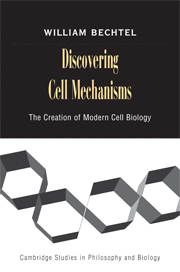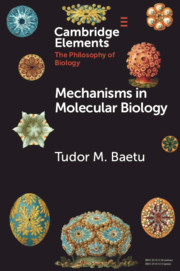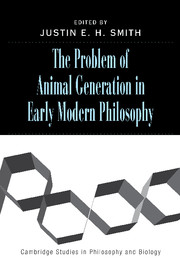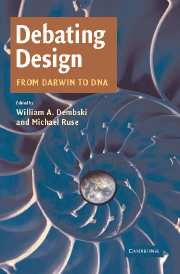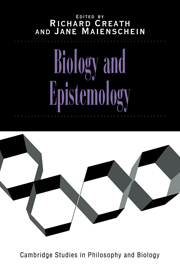Discovering Cell Mechanisms
Between 1940 and 1970 pioneers in the new field of cell biology discovered the operative parts of cells and their contributions to cell life. They offered mechanistic accounts that explained cellular phenomena by identifying the relevant parts of cells, the biochemical operations they performed, and the way in which these parts and operations were organised to accomplish important functions. Cell biology was a revolutionary science but in this book it also provides fuel for yet another revolution, one that focuses on the very conception of science itself. Laws have traditionally been regarded as the primary vehicle of explanation, but in the emerging philosophy of science it is mechanisms that do the explanatory work. Bechtel emphasises how mechanisms were discovered, focusing especially on the way in which new instruments made these inquiries possible. He also describes how new journals and societies provided institutional structure to this new enterprise.
- Develops an account of mechanistic explanation as it figures in the biological sciences
- Advances a revolutionary approach to philosophy of science in which mechanistic explanation is emphasised rather than laws
- Analyses the history of discovery of cell mechanisms and of the research techniques and instruments involved
Product details
July 2008Paperback
9780521729444
336 pages
227 × 151 × 20 mm
0.46kg
Available
Table of Contents
- Part I. Introduction: Cell Mechanisms and Cell Biology:
- 1. A different kind of science
- 2. The organization of science into disciplines
- 3. The new discipline of cell biology
- Part II. Explaining Cellular Phenomena through Mechanisms:
- 4. Historical conceptions of mechanism
- 5. Twentieth century conceptions of mechanism
- 6. Current conceptions of mechanisms
- 7. Representing and reasoning about mechanisms
- 8. Levels of organization and reduction
- 9. Organization: from Cartesian to biological mechanisms
- 10. Discovering and testing models of mechanisms
- 11. Conclusions
- Part III. The Locus of Cell Mechanisms: Terra Incognita Between Cytology and Biochemistry:
- 12. Cytological contributions to discovering cell mechanisms up to 1940
- 13. Biochemical contributions to discovering cell mechanisms up to 1940
- 14. The need to enter the Terra Incognita between cytology and biochemistry
- Part IV. Creating New Instruments and Research Techniques to Study Cell Mechanisms:
- 15. The epistemology of evidence: judging artifacts
- 16. The ultracentrifuge and cell fractionation
- 17. The electron microscope and electron microscopy
- 18. A case study of an artifact charge
- 19. Equipped with new instruments and techniques to enter Terra Incognita
- Part V. Entering the Terra Incognita Between Biochemistry and Cytology:
- 20. First steps towards cell biology at the Rockefeller Institute: Claude's introduction of cell fractionation
- 21. Robert Bensley: an alternative approach to fractionalism
- 22. Competing interpretations of fractions from normal cells
- 23. Linking Claude's microsomes to protein synthesis
- 24. Adding a biochemical perspective to the Rockefeller Laboratory
- 25. Adding electron microscopy as a tool
- 26. The state of cell studies at the end of the 1940's
- Part VI. New Knowledge: the Mechanisms of the Cytoplasm:
- 27. The mitochondrion
- 28. Microsomes, the endoplasmic reticulum, and ribosomes
- 29. Two additional organelles
- 30. Giving cell biology an institutional identity.

